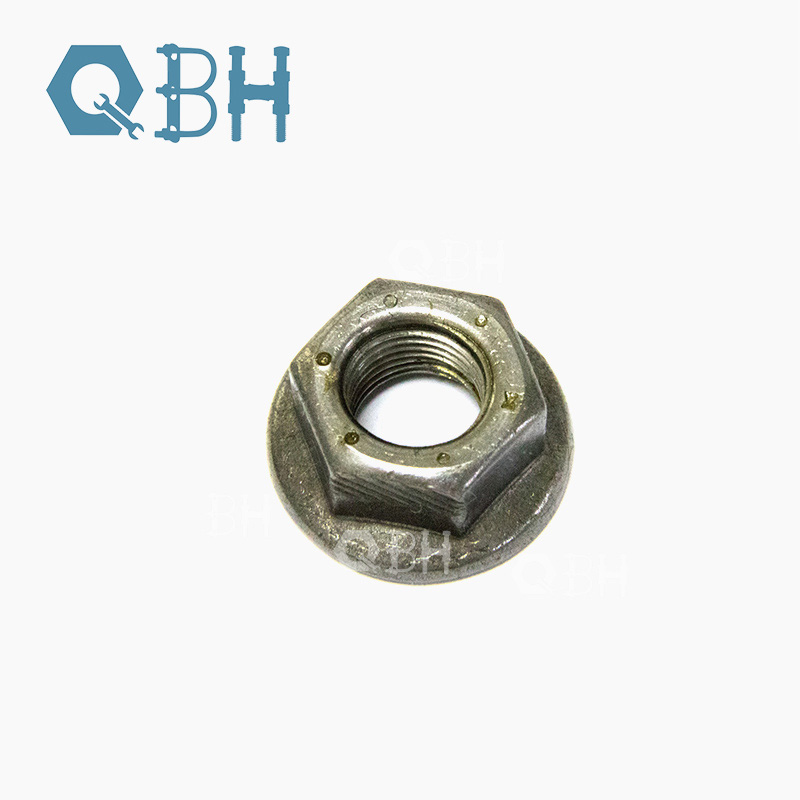How to Choose the Flange Nut for Your Application?
2025-09-01
Flange nuts are an essential fastening component widely used across industries such as automotive, construction, machinery, and electronics. Designed with an integrated washer-like base, flange nuts provide a larger bearing surface, distribute load evenly, and reduce the need for separate washers. As industries demand higher efficiency and secure fastening, understanding the types, materials, standards, and applications of flange nuts has become crucial.
What Is a Flange Nut and How Does It Work?
A flange nut is a hexagonal nut with a wide flange at one end, which acts like a built-in washer. This flange helps distribute the pressure of the nut evenly over the part being secured, preventing damage to surfaces and reducing the likelihood of loosening due to vibration.
Flange nuts are especially popular in high-vibration environments such as automotive engines, heavy machinery, and industrial equipment. By combining the functions of a nut and washer, they save assembly time and improve fastening reliability.
Key Features of Flange Nuts
-
Integrated Flange Design – Eliminates the need for a separate washer.
-
Vibration Resistance – Serrated flange nuts provide locking action, preventing loosening.
-
High Load Distribution – Reduces surface stress and deformation.
-
Versatile Applications – Suitable for automotive, construction, and mechanical systems.
Flange nuts are commonly manufactured to meet international standards, ensuring quality and interchangeability. Below is an overview of the primary specifications.
Flange Nut Product Specifications and Standards
When selecting flange nuts, engineers and buyers need to consider material, size, thread type, finish, and applicable standards. These factors directly affect strength, corrosion resistance, and suitability for specific environments.
| Specification | Description |
|---|---|
| Material | Carbon steel, stainless steel (A2, A4), alloy steel, brass |
| Sizes Available | M3 to M48 (metric), 1/8” to 2” (imperial) |
| Thread Types | Metric coarse, metric fine, UNC, UNF, BSF |
| Finish Options | Zinc-plated, hot-dip galvanized, nickel-coated, black oxide |
| Strength Grades | 8, 10, 12 (ISO); Grade 2, 5, 8 (ANSI) |
| Standards Supported | ISO 4161, DIN 6923, JIS B 1190, ANSI/ASME B18.2.2 |
| Flange Types | Smooth flange, serrated flange (for anti-vibration) |
| Applications | Automotive engines, structural assemblies, industrial machines, electronics |
By following standardized specifications, flange nuts ensure compatibility with bolts, threaded rods, and other fastening components.
How to Choose the Right Flange Nut
Choosing the right flange nut depends on multiple factors, including mechanical strength requirements, environmental conditions, and application needs. Here are the key considerations:
Determine the Right Material
-
Carbon Steel – Best for general-purpose fastening in dry environments.
-
Stainless Steel (A2, A4) – Corrosion-resistant and suitable for outdoor or marine applications.
-
Alloy Steel – Designed for high-strength applications such as engines and heavy machinery.
-
Brass or Nylon – Suitable for electronics and lightweight assemblies.
Select the Flange Type
-
Smooth Flange – Preferred when no surface damage is allowed.
-
Serrated Flange – Best for vibration-prone environments, as it grips the surface to prevent loosening.
Match the Thread Type
Ensure compatibility with bolts and studs. Metric coarse threads are common in Europe and Asia, while UNC and UNF threads are widely used in the U.S.
Consider Surface Finish
-
Zinc-Plated – Offers basic corrosion resistance.
-
Hot-Dip Galvanized – Provides heavy-duty protection in outdoor environments.
-
Nickel-Coated or Black Oxide – Enhances durability and appearance.
Verify Strength Grade
For safety-critical applications, ensure the flange nut’s strength matches the bolt grade to avoid mechanical failures.
Applications and Advantages of Flange Nuts
Flange nuts are widely used across industries due to their unique design and performance benefits. Below are the most common application scenarios:
Automotive Industry
Flange nuts are extensively used in:
-
Engine assemblies
-
Gearboxes
-
Suspension systems
-
Exhaust systems
Their vibration-resistant properties make them ideal for securing components under extreme stress.
Construction and Infrastructure
Structural engineers use flange nuts in:
-
Steel frameworks
-
Bridges and tunnels
-
Heavy-duty scaffolding
The integrated washer design simplifies installation and enhances joint stability.
Industrial Machinery
Flange nuts are commonly found in:
-
CNC machines
-
Hydraulic systems
-
Conveyor belts
They ensure secure fastening, even under high torque and operational vibration.
Electronics and Appliances
Lightweight flange nuts made from stainless steel or brass are preferred in:
-
Consumer electronics
-
Home appliances
-
Medical devices
Flange Nut FAQs
Q1: What is the difference between a flange nut and a regular hex nut?
A regular hex nut requires a separate washer to distribute pressure and prevent loosening, whereas a flange nut has an integrated washer-like base, saving assembly time and improving load distribution.
Q2: Are serrated flange nuts reusable?
Serrated flange nuts are generally reusable; however, repeated tightening and loosening can reduce the effectiveness of the serrations. For critical applications, replacement is recommended to ensure secure fastening.
6. Why Choose QBH for Flange Nuts?
With years of experience supplying fastening solutions, QBH is a trusted global manufacturer and supplier of high-quality flange nuts. Our products are manufactured to strict international standards, ensuring durability, precision, and compatibility across industries.
Why QBH Stands Out:
-
Extensive inventory covering all sizes, materials, and finishes
-
Custom manufacturing for special applications
-
Certified quality assurance under ISO, DIN, and ANSI standards
-
Fast global delivery and competitive pricing
For inquiries, technical support, or bulk orders, contact us and let our experts help you choose the perfect flange nut for your needs.



